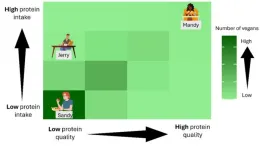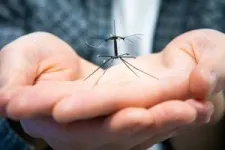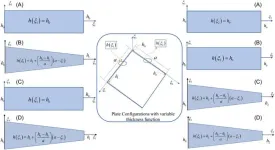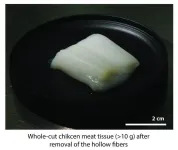(Press-News.org) In a new study of people with long-term vegan diets, most ate an adequate amount of total daily protein, but a significant proportion did not meet required levels of the amino acids lysine and leucine. Bi Xue Patricia Soh and colleagues at Massey University, New Zealand, present these findings in the open-access journal PLOS One on April 16, 2025.
Proteins are made up of various molecular “building blocks” known as amino acids. While the human body can synthesize most of the amino acids we need to live, we completely rely on the food we eat to provide the nine “indispensable amino acids” we cannot make ourselves. Typically, plant-based foods have more varied levels of indispensable amino acids that the body can use, as compared to animal-sourced foods, so they are of particular concern in vegan diets.
However, most prior research on protein in vegan diets has not considered specific amino acids nor the digestibility of different foods, which accounts for the fact that not all of what we eat, including amino acids, is fully utilized by the body.
To help deepen understanding of amino acid intake in vegan diets, Soh and colleagues analyzed detailed, four-day food diaries kept by 193 long-term vegans living in New Zealand. They used information from the United States Department of Agriculture and the New Zealand FoodFiles database to calculate participants’ intake of different amino acids from the different foods they ate.
The analysis showed that about three quarters of participants met daily total protein requirements. Accounting for body weight, intake of all indispensable amino acids also met requirements.
However, when considering digestibility, only about half of the participants met daily requirements for lysine and leucine levels, making them the most limiting indispensable amino acids in the study. Among the food types consumed by participants, legumes and pulses were the biggest contributors to overall protein and lysine intake.
These findings underscore that meeting total daily protein requirements does not necessarily mean meeting indispensable amino acid requirements. On the basis of their findings, the researchers call for future research to explore how intake of leucine and lysine could be boosted for vegans in a nutritionally balanced manner.
The authors add: “Vegan diets are the most restrictive form of plant-based eating, relying entirely on plant sources for all nutrients. Achieving high protein quality on a vegan diet requires more than just consuming enough protein – it also depends on the right balance and variety of plant foods to supply all the amino acids in the quantities that our body needs. Prolonged deficiencies in these essential nutrients can negatively affect overall protein balance, muscle maintenance and other physiological functions, especially in more vulnerable populations.”
“In our study, lysine and leucine were the most commonly under-consumed amino acids in our vegan cohort and fall below the daily requirements needed by our body. This is because many plant foods generally contain lower quantities of these amino acids that can be absorbed and utilized by the body. However, the inclusion of legumes, nuts and seeds emerged as valuable plant sources – not only to support overall protein intake but also to specifically increase lysine and leucine quantities in a vegan diet.”
Press preview: https://plos.io/4jbLuRI
In your coverage, please use this URL to provide access to the freely available article in PLOS One: https://plos.io/42dJMbG
Citation: Soh BXP, Vignes M, Smith NW, von Hurst PR, McNabb WC (2025) Evaluation of protein intake and protein quality in New Zealand vegans. PLoS ONE 20(4): e0314889. https://doi.org/10.1371/journal.pone.0314889
Author countries: New Zealand
Funding: Lottery Health Project Grant (LHR-2022-185) PhD stipend from the Riddet Institute, Massey University.
END
Even vegans who get enough total protein may fall short for some essential amino acids
In New Zealand study, 3 in 4 vegans ate sufficient protein, but half didn’t meet daily lysine and leucine requirements
2025-04-16
ELSE PRESS RELEASES FROM THIS DATE:
RoboBee comes in for a landing
2025-04-16
The Harvard RoboBee has long shown it can fly, dive, and hover like a real insect. But what good is the miracle of flight without a safe way to land?
A storied engineering achievement by the Harvard Microrobotics Laboratory, the RoboBee is now outfitted with its most reliable landing gear to date, inspired by one of nature’s most graceful landers: the crane fly.
Publishing in Science Robotics, the team led by Robert Wood, the Harry Lewis and Marlyn McGrath Professor of Engineering and Applied Sciences in the John A. Paulson School ...
“Ban-the-Box” policy did not effectively help job applicants with criminal records in one analysis
2025-04-16
Analysis of job applicant data from one large employer suggests that a policy meant to improve employment prospects for people with criminal records did not actually lead to changes in job offers for people with records. Deborah Weiss of Northwestern University, U.S., and colleagues present these findings in the open-access journal PLOS One on April 16, 2025.
Parts of the U.S. have introduced “Ban-the-Box” (BTB) laws, which aim to improve job prospects for people with criminal records. ...
Sunscreen, clothes and caves may have helped Homo sapiens survive 41,000 years ago
2025-04-16
ANN ARBOR—Ancient Homo sapiens may have benefitted from sunscreen, tailored clothes and the use of caves during the shifting of the magnetic North Pole over Europe about 41,000 years ago, new University of Michigan research shows.
These technologies could have protected Homo sapiens living in Europe from harmful solar radiation. Neanderthals, on the other hand, appear to have lacked these technologies and disappeared around 40,000 years ago, according to the study, published in Science Advances and led by researchers at Michigan Engineering and the U-M Department of Anthropology.
The team found ...
"Big surprise": astronomers find planet in perpendicular orbit around pair of stars
2025-04-16
Astronomers have found a planet that orbits at an angle of 90 degrees around a rare pair of peculiar stars. This is the first time we have strong evidence for one of these ‘polar planets’ orbiting a stellar pair. The surprise discovery was made using the European Southern Observatory’s Very Large Telescope (VLT).
Several planets orbiting two stars at once, like the fictional Star Wars world Tatooine, have been discovered in the past years. These planets typically occupy orbits that roughly align with the plane in which their host stars orbit each ...
Astronomers find rare twist in exoplanet’s twin star orbit
2025-04-16
Astronomers have discovered a planet that orbits at a 90-degree angle around a rare pair of strange stars – a real-life ‘twist’ on the fictional twin suns of Star Wars hero Luke Skywalker’s home planet of Tatooine.
The exoplanet, named 2M1510 (AB) b, orbits a pair of young brown dwarfs — objects bigger than gas-giant planets but too small to be proper stars. Only the second pair of eclipsing brown dwarfs known – this is the first exoplanet found on a right-angled path to the orbit of its two host stars.
An international team of researchers led ...
Crystal clues on Mars point to watery and possibly life-supporting past
2025-04-16
A QUT-led study analysing data from NASA’s Perseverance rover has uncovered compelling evidence of multiple mineral-forming events just beneath the Martian surface – findings that bring scientists one step closer to answering the profound question: did life ever exist on Mars?
The QUT research team led by Dr Michael Jones, from the Central Analytical Research Facility and the School of Chemistry and Physics, includes Associate Professor David Flannery, Associate Professor Christoph Schrank, Brendan Orenstein and Peter Nemere, together with researchers from North America and Europe.
The findings were published in the prestigious journal ...
Microbes in Brooklyn Superfund site teach lessons on fighting industrial pollution
2025-04-16
Using advanced DNA sequence analysis, a research team led by NYU Tandon School of Engineering's Assistant Professor Elizabeth Hénaff has discovered that tiny organisms in Brooklyn's highly contaminated Gowanus Canal have developed a comprehensive collection of pollution-fighting genes.
The findings were published in the Journal of Applied Microbiology on April 15, 2025.
The team identified 455 species of microorganisms wielding 64 different biochemical pathways to degrade pollutants ...
Porous and powerful: How multidirectional grading enhances piezoelectric plate performance
2025-04-16
Piezoelectric materials have long been celebrated for their ability to convert mechanical energy into electrical energy, making them indispensable in smart systems for sensing, actuation, and vibration control. However, incorporating porosity and multidirectional grading into these materials introduces a host of challenges in understanding their behavior under varying environmental conditions. These complexities are further compounded by the interaction of hygrothermal conditions with electrical and mechanical loads. As a result, there is a pressing need for more in-depth research to predict the real-world performance of these materials.
Published ...
Study finds dramatic boost in air quality from electrifying railways
2025-04-16
Switching from diesel to electric trains dramatically improved the air quality aboard the San Francisco Bay Area’s Caltrain commuter rail line, reducing riders’ exposure to the carcinogen black carbon by an average of 89%, finds a new study published today in the journal Environmental Science and Technology Letters.
The electrification of the system also significantly reduced the ambient black carbon concentrations within and around the San Francisco station, the study found.
“The transition from diesel to electric trains occurred over just a few weeks, and yet we saw the same drop in black carbon concentrations in the station as California ...
Bite-sized chunks of chicken with the texture of whole meat can be grown in the lab
2025-04-16
A bioreactor that mimics a circulatory system can deliver nutrients and oxygen to artificial tissue, enabling the production of over 10 grams of chicken muscle for cultured meat applications. These results are publishing in the Cell Press journal Trends in Biotechnology on April 16.
“Our study presents a scalable, top-down strategy for producing whole-cut cultured meat using a perfusable hollow fiber bioreactor,” says senior author Shoji Takeuchi of The University of Tokyo. “This system enables cell distribution, alignment, contractility, ...
LAST 30 PRESS RELEASES:
2026 Young Investigators: ONR celebrates new talent tackling warfighter challenges
Genetics help explain who gets the ‘telltale tingle’ from music, art and literature
Many Americans misunderstand medical aid in dying laws
Researchers publish landmark infectious disease study in ‘Science’
New NSF award supports innovative role-playing game approach to strengthening research security in academia
Kumar named to ACMA Emerging Leaders Program for 2026
AI language models could transform aquatic environmental risk assessment
New isotope tools reveal hidden pathways reshaping the global nitrogen cycle
Study reveals how antibiotic structure controls removal from water using biochar
Why chronic pain lasts longer in women: Immune cells offer clues
Toxic exposure creates epigenetic disease risk over 20 generations
More time spent on social media linked to steroid use intentions among boys and men
New study suggests a “kick it while it’s down” approach to cancer treatment could improve cure rates
Milken Institute, Ann Theodore Foundation launch new grant to support clinical trial for potential sarcoidosis treatment
New strategies boost effectiveness of CAR-NK therapy against cancer
Study: Adolescent cannabis use linked to doubling risk of psychotic and bipolar disorders
Invisible harms: drug-related deaths spike after hurricanes and tropical storms
Adolescent cannabis use and risk of psychotic, bipolar, depressive, and anxiety disorders
Anxiety, depression, and care barriers in adults with intellectual and developmental disabilities
Study: Anxiety, gloom often accompany intellectual deficits
Massage Therapy Foundation awards $300,000 research grant to the University of Denver
Gastrointestinal toxicity linked to targeted cancer therapies in the United States
Countdown to the Bial Award in Biomedicine 2025
Blood marker from dementia research could help track aging across the animal world
Birds change altitude to survive epic journeys across deserts and seas
Here's why you need a backup for the map on your phone
ACS Central Science | Researchers from Insilico Medicine and Lilly publish foundational vision for fully autonomous “Prompt-to-Drug” pharmaceutical R&D
Increasing the number of coronary interventions in patients with acute myocardial infarction does not appear to reduce death rates
Tackling uplift resistance in tall infrastructures sustainably
Novel wireless origami-inspired smart cushioning device for safer logistics
[Press-News.org] Even vegans who get enough total protein may fall short for some essential amino acidsIn New Zealand study, 3 in 4 vegans ate sufficient protein, but half didn’t meet daily lysine and leucine requirements









